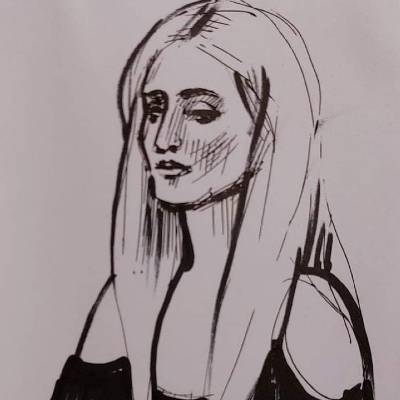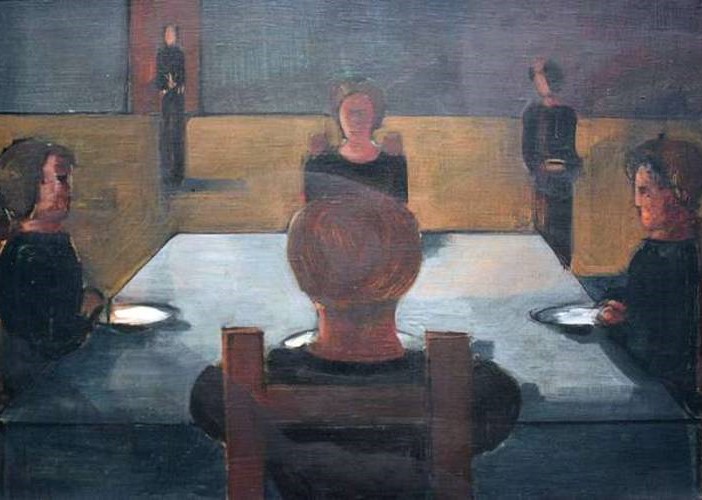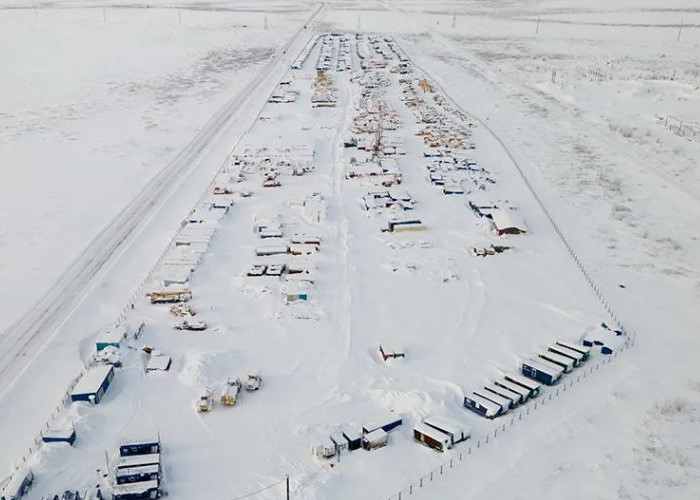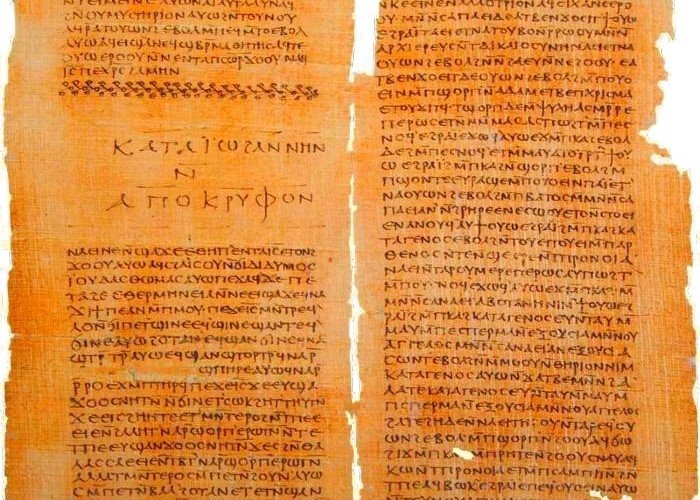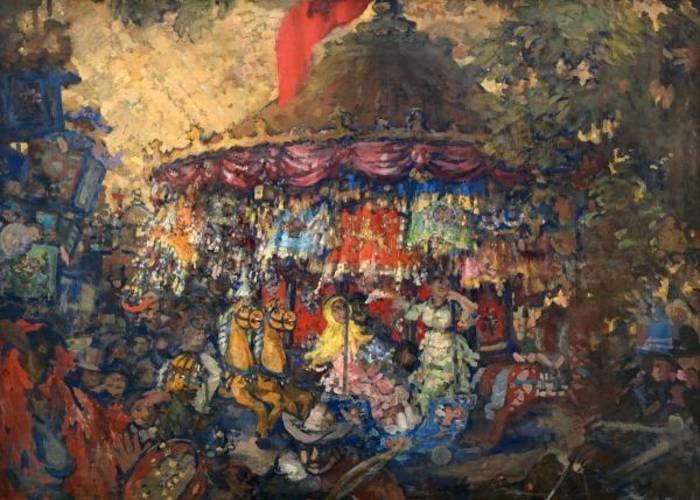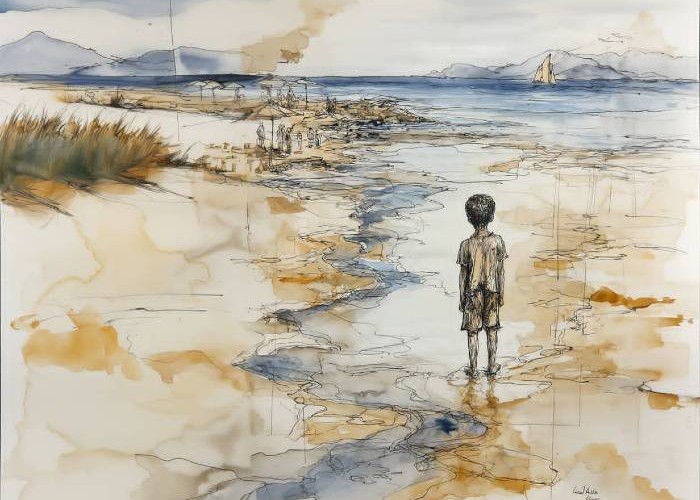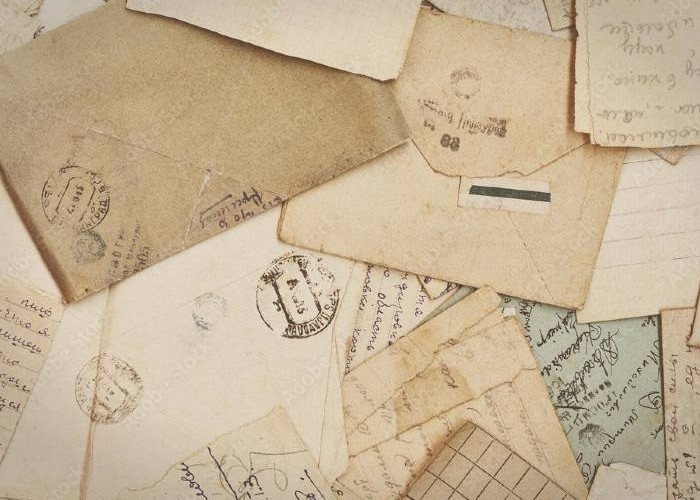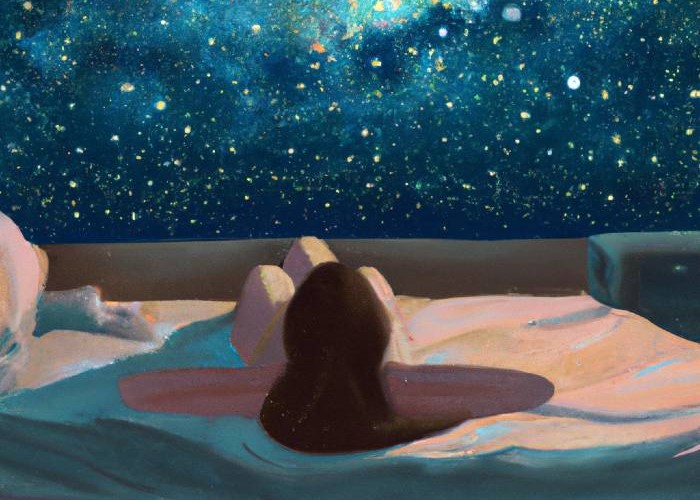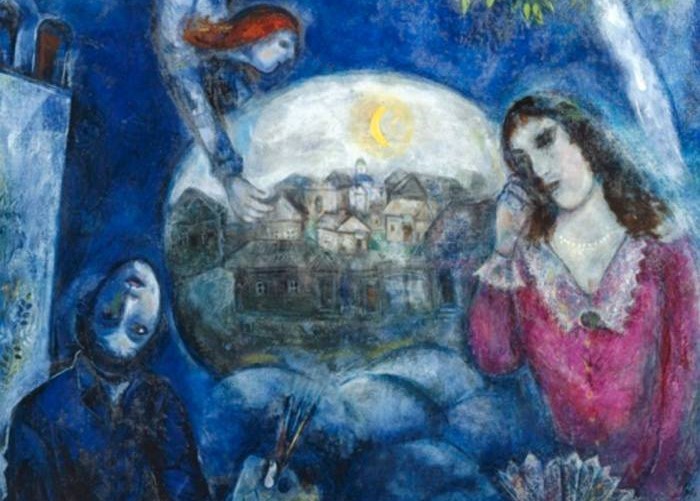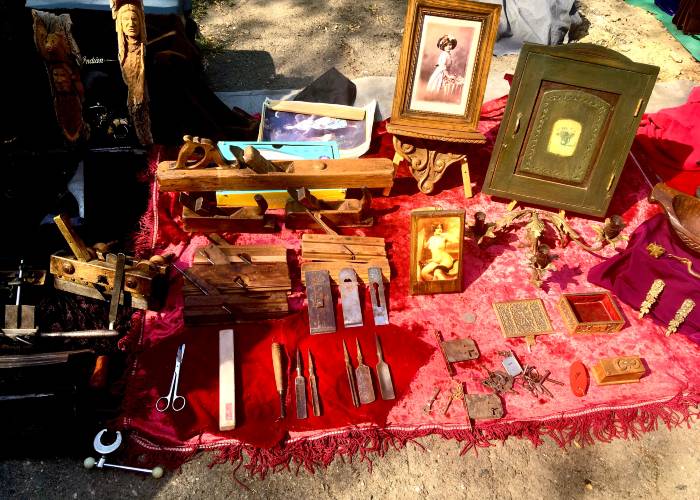The scar on his arm looked like a flying bat. Raised, jagged, red-purple, it glistened between the silver hairs on Storm’s arm whenever he rolled his sleeve to polish his combat boots or to saw a log in the yard. The scar was ugly and spine-chilling, just like his rusty saw, just like Storm himself. If you saw it once it got stuck in your memory like a splinter.
Storm, or Benya Stormberg, lived all alone in a dark room at the end of the long hallway of our communal apartment. Everyone called him Storm but no one really talked to him. No one had ever been to his room. He never drank vodka with men. He never slapped women on jiggling behinds in the steam-drenched kitchen. We, the children, ran away from him. At night we baked gnarly potatoes with purple eyes under the old linden in the far corner of the yard. We picked potatoes out from smoldering coals, burning our fingers, blew at wrinkled skins, and whispered scary stories about Storm.
“You know, M on his arm stands for a Man-eater,” Nikita from the other yard would say.
“No,” answered Rita, licking her soot-covered fingers. “He’s a sorcerer, and he is one thousand years old.”
“Storm is a monster,” I always said. “He murdered young women when he was young. My mama told me so. She said to never talk to him, ever.”
During the day Storm hid in his room. At sunset, he limped out down the corridor, settled on the bench in the yard, and rolled cigarettes. His tobacco smelled like old ship ropes in the port. A tar-black cat usually sat by his side. For hours they stared in the distance in complete silence. Then he sawed logs. He made a living by selling firewood to the many families of our old pink building, drafty and cold in winter.
One evening just before dusk I stepped out into the yard to play hopscotch and saw Nikita hunched up over something on the ground under the linden. I ran over. He held Storm’s black cat in the canvas bag, the strings around its neck. Nikita pulled on the strings, his mouth twisted. The cat’s eyes popped up like soap bubbles and covered with a whitish film. Its red mouth opened. A pink tongue stuck out like a piece of plastic washed on the seashore. A strange hissing sound came out of the cat’s throat. I didn’t think long. I took a rock from the ground and hit Nikita on his dirty blond head, right above his temple. He let go of the bag and grabbed his forehead with both hands. I saw bright blood splashing through his fingers, pouring over his bitten nails, but I didn’t care. I untied the strings, and, cat in hands hot and heavy, ran back towards the door, feeling the boy stumping after me, raising dust in the air, panting, puffing.
By the front door, I bumped into Storm. With his hawk beak nose, silver hair like horns, and red eyes he looked like a devil himself. Storm moved me aside, stepped forward, grabbed Nikita by his collar, and lifted him off the ground like a puppy.
“You come here one more time, you touch this girl or this cat one more time,” he said in a low voice, “you’re dead. You understand?”
“I understand,” said Nikita. I saw his pants getting dark between his legs and pee streaming down his legs.
Storm unclasped his hand and the boy ran as if he had wheels.
The cat scratched its way out of the bag, flipped in the air like a squirrel, landed on the grass, and disappeared into the basement. I looked at the long thin scratches on my arm. Storm looked at them, too, nodded and something like a smile moved over his brown face.
Ever since then, we have formed a friendship of sorts. He still sat and smoked, as always, the black cat by his leg. Sometimes, though, I’d come closer and just stood there, running my fingers over my red ball, staring at the cat, and Storm’s wrinkles, and his scar. After two weeks, he asked me, “What’s your name?”
“Manya,” I whispered.
In a month, I sat next to him, dangling my feet, and he told me stories about pirates, parrots, and robbers in Odesa in the olden days.
And then, one day, he asked me if I wanted to know about his scar. He let me touch it. Close up, the scar was the color of overripe grapes. It felt rough at the edges and smooth—almost velvety like the cat’s back—in the middle.
“A long time ago on a dark night, I came to Odesa from Amur on a long green train.”
“Amur means love in French,” I said, proud.
“Amur was a small gangster town in Ukraine,” said Storm. “Odesa was a mess, but it was a rich mess. Ukrainians were killing Ukrainians. Russians were killing Russians, and everyone was killing us Jews. But I came with Jewish hitmen and crooks, the Mob, we called it. We hit back.
“The Reds were in charge at the time. They wore black leather jackets, boots that crinkled at night, and revolvers on straps. The Reds just won over the Whites. The Whites fled on big ships, to Istanbul.
“The Mobsters wore purple bell bottoms and flashy jackets. We didn’t take sides. We took pride in not taking sides. The Mob lived by its own law. We hid our guns and crooked knives under our chic yellow and pink vests. We lived in abandoned buildings, in catacombs, and ruins, but we wore bow-ties and shined our buttons and boots. We killed, robbed, and gambled, but we had fun.
“The Mob had a boss. Murka. Murka was one of a kind. No one fucked with her. If she said something, so was it. She jumped like a cat off the roofs during robberies, without making a sound. She cut off diamond rings from her fingers and carved Ms on her lover’s shoulders. With her small black razor. She carried this razor blade hidden inside of her boot.
“I was twenty, and I was an orphan since birth. I lost my mind over Murka. She smelled like Odesa in summer: sweets, sea, and raw meat. Her hair looked like a black cat, like the Black Sea itself. Her eyes shone like ripe cherries. When she sat near to me I had no air to breathe.
“I robbed for her, I killed for her. I brought her money, cocaine, golden rings and bracelets, silks, laces, and necklaces.
“Murka loved me, too. She called me her little hawk. I called her Murka, my little kitten. She cut an M on my arm. Under that linden, on the grass.”
“Did it hurt?”
“It hurt. It hurt and bled good. Then Murka did something she never had done. She cut S on her arm. For Storm. Then she threw her razor at me, and it flew and got stuck in the bark of the linden. She laughed, her teeth were white like sugar cubes. She loved me.
“That summer life was good. Love was good, and the Mob ruled Odesa. Gunfire shook the crooked streets. The Reds chased the Mob, but they couldn’t get us.
“But summer ended, and in fall our luck ran out. Arrests, failures, and raids fell like rain. Someone ratted us out. We couldn’t find who it was. Murka got sad. She started to disappear. I tried to follow her, but she could vanish in the dark like a cat. Life was empty without Murka. I started to drink.
“One night I went out with Moisha Tickle to take care of business. It was a corner drug store robbery. Tickle, he said, he was thirsty, let’s have a drink. So we went inside that kosher restaurant, and I saw Murka. First I saw her black hair. Then I saw a black leather jacket. Then a revolver, on a strap, on her hip. She laughed, and the Red commissar put his arm around her.
“That’s how I knew who ratted us out. Murka did. She ratted us out. I came to her, and my heart bled.
“‘Murka,’ I said.
She didn’t look at me, just kept laughing.
“‘Why? You had everything. I got you rings, skirts, and jackets. What was that you wanted? I didn’t say that. Just thought it. Instead, I said, ‘Hello, my dear Murka. My dear, dear Murka. Hello, my dear Murka and goodbye.’
“And then I pulled her razor blade out of my boot and stabbed her in the back. And the Red jumped up but I stabbed him, too, and he fell like a sack of potatoes, next to her.
“’Forgive me, Murka,” I said. I cleaned the blood on her stocking, the stocking I gave her, shiny like mermaid skin, and I put the blade back into my boot and walked out.
“Did the Reds catch you?” I asked.
“No,” said Storm. “Finkl, the old owner, he turned away, moved his bottles around, or killed cockroaches, like he didn’t see me or two of them in blood. There were other Jews in the restaurant, but they looked into their plates and just kept drinking. No one cared for the Red commissaries and their whores. So I went out and that’s that. I loved her. You’re a child, you don’t understand,” said Storm.
I wanted to understand.
Long after my mama forbade me to sit on the bench with Storm, and long after he died suddenly of a heart attack, all alone in his room, I thought about Murka, and Storm, and their good love under the old linden, and the ancient black cat.
